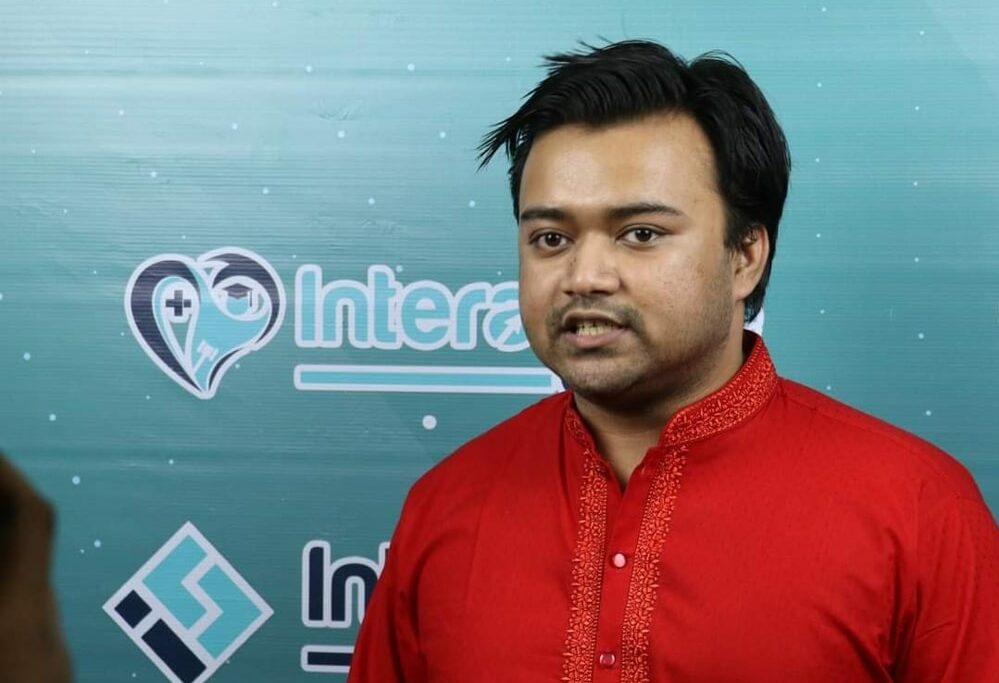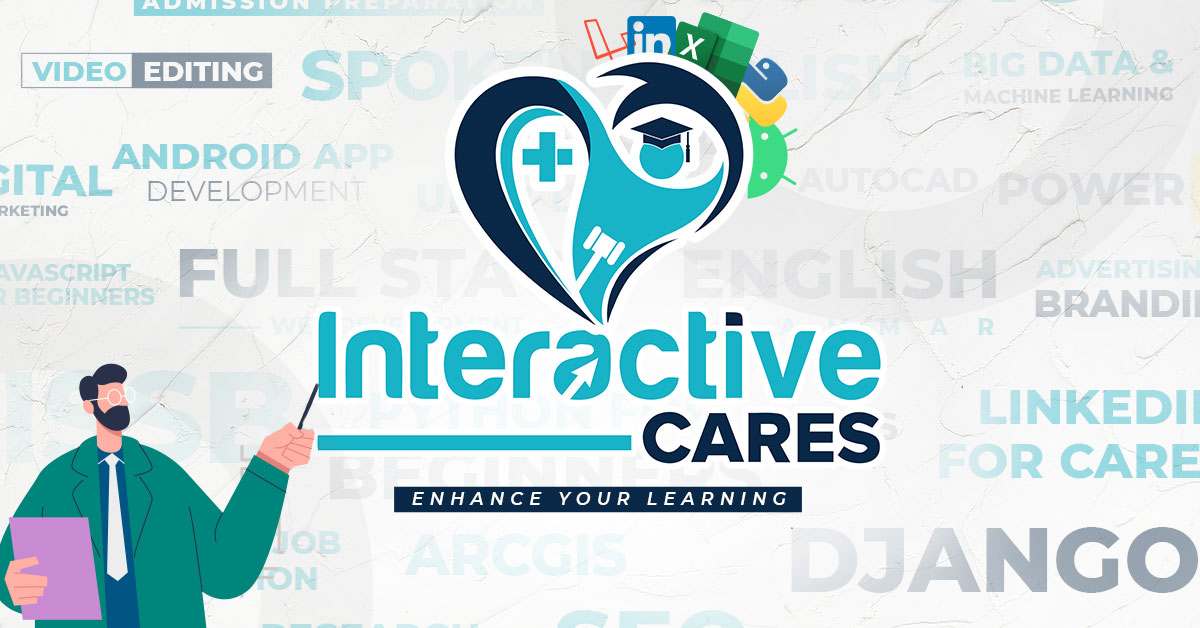
Rare Al Samir is the founder and CEO of Dhaka-based edtech startup Interactive Cares. Interactive Cares operates at the intersection of skills development, select test preparation, and competitive exams. The company collaborates with experts for creating courses and says it has experienced phenomenal growth in the past two years.
In this interview with Mr. Samir, we try to learn about his path to entrepreneurship, the origin and early days of the company, dive deep into where the company stands today, its products and services, strategic ambition, and much more.
Future Startup: Thank you for agreeing to this interview with us. Could you please tell us about your background and your path to entrepreneurship and what you are doing today?
Rare Al Samir: I attended Govt. Laboratory High School and Rajuk Uttara Model College for my school and college. I was a serious student from an early age, which paid off and I received several scholarships as one of the top students in my class. After HSC, along with university admission applications, I also applied for the Bangladesh Army and got selected. I eventually decided to join there.
However, after about two years in the Army, I had an injury and had to leave. I returned to study and went to BUP where I studied Finance. While at University, I taught students. I think I taught a few thousand students. I also ran an offline education business which gave me an insight into the education market in Bangladesh. I had the opportunity to closely observe both students and their guardians and learn their preferences and expectations. That eventually led to my fascination with the education business.
In the early days of my entrepreneurial journey, my days in the military came in handy. You go through this extreme training and leadership exercise that helps build confidence and the ability to deal with challenges.
Future Startup: When and how did you come up with the idea of Interactive Cares and get started?
Samir: As I mentioned, I had the opportunity to observe the education landscape closely both as a teacher and as a small education entrepreneur. I came to see that there was not enough high-quality work in online education apart from free Facebook and Youtube videos. Since I got interested in the education space, I studied the global market and came across some fascinating companies such as BYJU’s, Chegg, Udemy, Coursera, etc. I was deeply passionate about education, so I thought there are opportunities in this space to work. That eventually led to Interactive Cares. We were the first platform to offer interactive education and problem-solving opportunities in Bangladesh. We were not only offering you pre-recorded video courses, but you could also interact with a teacher or mentor and work closely. That's where our name Interactive Cares comes from.
There is a dearth of Bangla language skill development and technological education courses. There are now a few platforms that offer Bangla courses, but most of them don’t help with job placements, etc.
We wanted to change that. We started Interactive Cares in 2020 with the ambition to tackle the unemployment problem in Bangladesh. We want to help improve the employability of our young people through integrated courses, career paths, learning path programs, and masterclasses.
Future Startup: What went into building the initial operation of Interactive Cares i.e. how did you put together initial investment and other resources to get started? Please walk us through what the first few months to one year of Interactive Cares and your journey were like.
Samir: I had some savings from my time at the Bangladesh Army and also earned from teaching students, so I initially invested from my own pocket. I met my co-founder Khushbu in 2016. Before Interactive Cares, she worked for Saifurs for 5 years. Both of us were into co-curricular activities such as the math olympiad, quiz competitions, debates as students, so we knew people who could help. Since we both had experience working in the education industry, it was easier for us to start and build initial traction.
In the first year, we started with free masterclasses and events in collaboration with prominent universities, which helped us to get a few thousand students. We launched a few of the initial courses within our close network. Those courses did well because of our unique customer acquisition strategy. We got a few thousand students from there. We took our first office in October 2020 at Elephant Road.
Future Startup: What were some major challenges you faced in the early days and how did you deal with them?
Samir: The initial few challenges came from a lack of funding, operation, and product design. When the pandemic hit in early 2020, we had a difficult time. Our course production stalled and consequently, our business suffered. But we never lost hope. We kept our motivation and kept working hard. We work hard despite the challenges to design, market, and validate our products. People were not particularly enthusiastic about online education before 2020. But when COVID hit, the entire landscape changed. We got a massive response from the market. A large number of people turned to online learning.
While we were happy with the growth, we were also concerned that people might stop doing online courses when everything returns to normalcy. But to our surprise, we grew 10X in 2021. We have since experienced consistent growth. Our retention rate has also increased to 62% last month.
Future Startup: What were some of the things that worked, strategically, in the early days that helped you to grow the business and become sustainable?
Samir: We focused on targeted partnerships — we built partnerships with 35 clubs from different universities, offered free masterclasses, and organized events to prepare the market. It helped us to build a database of one lakh students within a short time.
While doing all these, we kept building our portfolio by creating quality integrated courses. The comprehensive approach helped reach our target audience and build awareness about our service in the market in the early days.

Future Startup: Could you please give us an overview of Interactive Cares today i.e an overview of your products and services, business model, how your operation works, size of business, team, etc?
Samir: Currently, we have 4 products: integrated courses, specialized career path programs, learning path programs, and masterclasses. Most of our revenue comes from these four products. If we talk about creating courses, we hire prominent instructors for creating our courses — in most instances, the people we work with are in the top 5% of their industry.
Our course launching follows a standard process. Before launching a course, we offer a free masterclass on the same course topic which helps us to gauge the demand and get feedback from students regarding what they want in that particular course. It also helps us to get potential student data that we eventually use to market the course after launching it.
We currently follow an integrated model when it comes to designing courses. Students can get video lessons, live classes, and also extensive 24/7 private mentor support. 80% of our students said they like our integrated model. We try to provide the best content with exclusive interactive problem-solving opportunities.
In our career path programs, we not only provide learning and teaching but also create placement opportunities for our students. To date, several hundred students got job and internship opportunities through our career path program. We usually forward the CVs of our students to prominent companies in Bangladesh and abroad. Nowadays many companies approach us for potential candidates.
In our Learning Path Program, we focus on collaborative learning through real-time projects. We are the first platform to do something like this in Bangladesh. In our Spoken English Learning Path, during the first month, students learn through videos and live classes. In the second month, they practice speaking every day for one hour with our mentors and partners in their groups. The approach helps them improve quickly. By the time they finish the program, their English-speaking ability automatically grows to a decent level even if they start from scratch.
Currently, we are a team of over 50 people. Additionally, we have another 1000-plus affiliate marketers and campus ambassadors who work with us in various capacities.
We have 65 courses, 7 career paths, and one learning path on our platform. We have so far run 70 free masterclasses.
We currently serve over 50,000 students through our different courses. We have experienced a 900% growth in 2021.
Samir: Students love our integrated courses since they get both recorded videos and live sessions in the same package. Our career path program prepares students for specific jobs and connects them with top-notch companies and industry experts. The program has gained an excellent response from the market.
Product journey-wise: students sign up on our website and app first. Students can watch free and demo classes from any course on the platform and enroll afterward if they want. They can also join live classes with one click from the course module. Our front end is built with HTML, CSS, and Bootstrap. The backend is built with PHP. We are also working on our native virtual classroom soon.
Future Startup: How have you attracted users and grown Interactive Cares? Could you tell us about strategies and activities that you carried out to achieve growth? How do your sales and marketing work?
Samir: It is all about keeping trying and trying everything until you find the things that work. We have used all kinds of strategies. If I mention some of them: we have done events, partnerships with university clubs, campus ambassadors and affiliate marketer programs, roadshows, and workshops in collaboration with different organizations and clubs.
We regularly invest in paid marketing and organic campaigns to generate sales. We are doing Telesales. We did influencer marketing in the past.
One good thing that has happened over the past years is that our retention rate has increased, which has helped reduce our CAC. We are now mostly focused on organic sales.
Future Startup: What are some mistakes you’ve made if any, that you want other entrepreneurs to avoid?
Samir: Research is critical before launching something. We often think we know enough to start and discount research. Second, it is useful to build a good credible network. If you have a strong network it helps with everything from product launch to funding to strategic partnerships. Third, building a great team is incredibly important.
Future Startup: What is your take on the edtech market in Bangladesh? How big is the market? What are the major trends? What are the challenges and opportunities in the vertical?
Samir: The market has seen phenomenal growth in the past three years. COVID has played a strong role in that growth. This is fascinating because if we look a few years back, the market was not ready. Things can change fast. Several estimates suggest the edtech market in Bangladesh can be worth as much as $6 billion. The opportunity in the sector is huge.
Trend-wise, I see meaningful opportunities in the skills, job preparation, and workforce development-related verticals. With the rise of remote work, work has gone borderless. Companies are hiring globally. To that end, the demand for freelancing skills has grown significantly over the years.
Future Startup: How do you deal with the challenges and stress that come with being a founder?
Samir: I have accepted the fact that challenge is a part of the journey. My experience in the Bangladesh Army has been tremendously helpful. I have learned to deal with challenges and stress.
I think passion is an antidote to fear and challenges. If you are passionate about building an enduring company, that passion will prepare you for any challenge. You will find a way out. That passion will not let you sleep at night.
Future Startup: 3 books you would like to recommend to our readers.
Samir: I would recommend three books:
